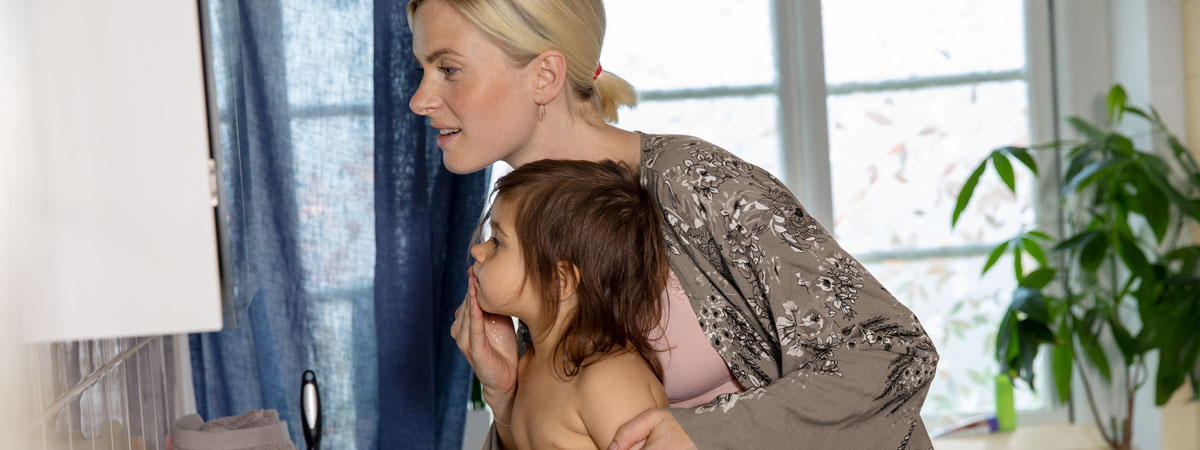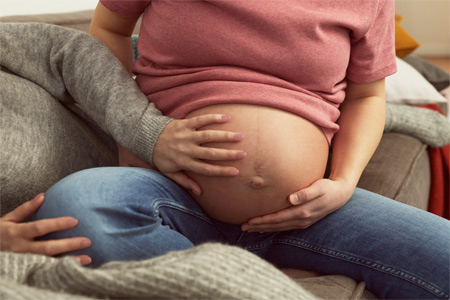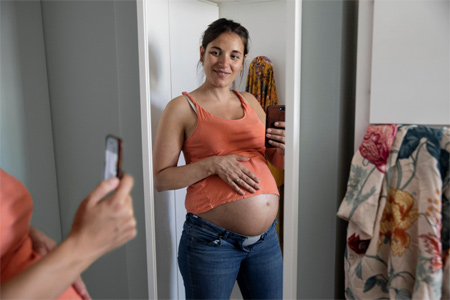Skin and hair during pregnancy
Stretch marks, acne and pigmentation changes... or thicker hair and pregnancy glow? Your skin and hair might change radically during pregnancy – for better or for worse.
It might feel pretty unfair if you happen to get struck with acne, stretch marks and oilier skin during your pregnancy. Maybe it’s a little upsetting to hear about other pregnant people who ended up with smoother skin and shiny hair? If you got the short end of the stick, it could be comforting to know that this will pass – and you’re not alone. In fact, it’s equally common to not experience that glow that everyone’s always talking about – or for the only glow you get to be from nausea and vomiting. But one thing that affects all pregnant people is for the skin to become more sensitive; you do need to protect it a little bit extra in a few different ways.
Stretch marks during pregnancy often appear on the belly, breasts and thighs.
Yes, it might feel kind of lousy to get stretch marks while you’re pregnant, but rest assured that they will fade after childbirth. And we should probably take a step away from messages about body standards that make us look down on ourselves and instead celebrate our bodies for the things they’re capable of doing. It’s pretty remarkable how our bodies can stretch like that, when you think about it! Even after the stretch marks have faded, they are a testament to just how amazing the body is. That said, stretch marks, or striae as they’re actually called, can also cause a lot of itching. And that isn’t much fun. Try to prevent your skin from getting dry, which can lead to even more itchiness. Regularly treat your skin to a moisturiser and skip soaps, which can cause dryness. And – as always – it’s a good idea to drink plenty of water. It may not make your skin more elastic or appear 20 years younger, but it will help keep it moisturised from the inside.
Rubbing oil into your belly can feel really nice, and it can be a cosy moment for you and for your baby. However, there’s no evidence that it reduces the occurrence of stretch marks. The only exceptions we’re aware of are products containing Trofolastin and Centella asiatica: scientific studies actually do show that these ingredients are quite effective when rubbed in every day from the start of your pregnancy. If you’re interested, you can google products and research findings.
Pigmentation is common during pregnancy
All pregnant people develop more pigment in their skin, but just how visible it is varies and depends largely on what your skin pigment was like to begin with. However, most people do find that their nipples get darker. Later in pregnancy, many people also develop a dark line on their belly, called linea nigra. It usually begins at the naval and continues below the panty line. It is also common to develop pigmentation called chloasma, or melasma, on the face. If that sounds less than ideal, you may feel better to know that these pigment changes, both on the face and tummy, fade a little while after childbirth.
Can you sunbathe while pregnant?
You should always be careful in the sun, of course, but when you’re pregnant, you are extra sensitive to UV rays, so you do need to be extra mindful to protect your skin. If you don’t want to worsen the occurrence of chloasma, then invest in a high SPF – or better yet, find some shade. Because unlike normal pigment changes that happen in tandem with hormonal changes, pigmentation developed in the sun won’t usually disappear. The baby in your belly certainly won’t be harmed by the sun, but mum’s skin can develop lasting damage. So invest in a sun hat and sunscreen and find some shade! It’s just as well that you get used to it now, because once your baby is here, you’ll be spending a lot of time seeking out shade. Tanning salons are inadvisable in general, but when you’re pregnant, it’s especially important to skip them. However, if you’re feeling hopelessly pale and washed out, sunless tanning products are usually fine to use, but just in case, always ask at the pharmacy about the brand you want to buy.
Pregnancy acne or pregnancy glow?
Hormones don’t only affect our mood; the increased quantity can also lead to bad skin while you’re pregnant. If you already had problem skin, there is a slightly higher chance that it will worsen during pregnancy. But even if you’ve never had hormonal acne, you might develop it for the first time when it’s up to your pregnancy hormones. Unfortunately, most acne medications are not okay for use by pregnant people, so usually, the recommendation is to wait on treatment until the baby is born. Otherwise, talk to your usual doctor to see what can be done. Even if your skin feels oily, it’s important to keep on moisturising daily, or your skin might start to compensate for dryness and try to produce more oil.
But it’s not all pimples and a shiny forehead. You might also find that the quality of your skin improves significantly during pregnancy. Thanks to the increased quantity of blood, wrinkles or lines might fill out, and your cheeks may develop a light, rosy hue – that much-discussed pregnancy glow has arrived! If you had problem skin, it might not necessarily get worse during pregnancy. On the contrary, there are plenty of examples of acne essentially disappearing entirely. It’s all a bit of a lottery, and if you get pregnant again, it won’t necessarily go the same way for your skin.
Skincare for pregnancy
Like we said, it’s all a bit of a lottery and it’s tough to know in advance how your skin will change, but most people do develop more sensitive skin in general. In addition to avoiding the sun, you should consider using mild products, and always ask at the pharmacy if you’re uncertain about what products you can use during pregnancy. The fact that your skin becomes more sensitive also means you may develop reactions that you didn’t have before, for example from waxing and body scrubs, so for now, it’s best to skip these kinds of treatments or daily luxuries.
Thick, luscious hair?
It’s true: during pregnancy, many people find that their hair becomes simply spectacular. Hormones can cause hair to grow more and look shinier. Your hair might not just grow faster; you might also lose less than usual during pregnancy. Your hair might also last longer and not require as much washing – but for some people, unfortunately it may be the exact opposite. Another funny thing your hair might do it is to take on a new texture, for example, your straight hair could develop waves. Surprisingly, increased hair growth can also happen in other, slightly less desirable places. Hairier arms and legs, or a fuzzy upper lip, are not unusual. If you’ve grown unwanted hair, rest assured: the hair usually falls out soon after the baby is born. Unfortunately, this is also true of the hair on your head, which may get thinner and less healthy-looking for many people – so enjoy those luscious locks while they last. If it’s a little depressing to think about your thin-haired future, don’t worry. When your hormones have settled down after pregnancy, and if you breastfeed, once you’re done, your hair will return to normal – though potentially with a new texture.
Please note that all information above is based on Swedish recommendations.


